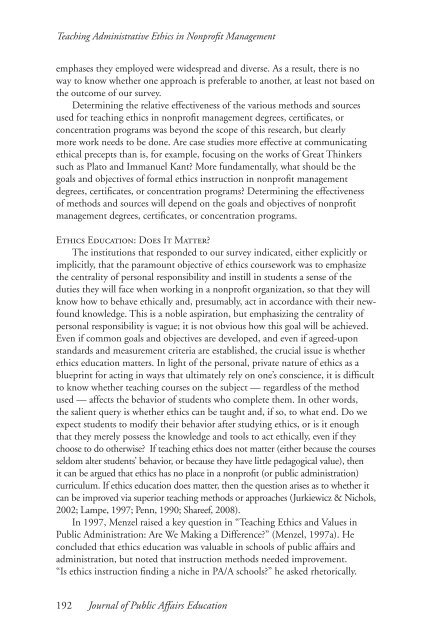JOURNAL OF PUBLIC AFFAIRS EDUCATION - Naspaa
JOURNAL OF PUBLIC AFFAIRS EDUCATION - Naspaa
JOURNAL OF PUBLIC AFFAIRS EDUCATION - Naspaa
You also want an ePaper? Increase the reach of your titles
YUMPU automatically turns print PDFs into web optimized ePapers that Google loves.
Teaching Administrative Ethics in Nonprofit Managementemphases they employed were widespread and diverse. As a result, there is noway to know whether one approach is preferable to another, at least not based onthe outcome of our survey.Determining the relative effectiveness of the various methods and sourcesused for teaching ethics in nonprofit management degrees, certificates, orconcentration programs was beyond the scope of this research, but clearlymore work needs to be done. Are case studies more effective at communicatingethical precepts than is, for example, focusing on the works of Great Thinkerssuch as Plato and Immanuel Kant? More fundamentally, what should be thegoals and objectives of formal ethics instruction in nonprofit managementdegrees, certificates, or concentration programs? Determining the effectivenessof methods and sources will depend on the goals and objectives of nonprofitmanagement degrees, certificates, or concentration programs.Ethics Education: Does It Matter?The institutions that responded to our survey indicated, either explicitly orimplicitly, that the paramount objective of ethics coursework was to emphasizethe centrality of personal responsibility and instill in students a sense of theduties they will face when working in a nonprofit organization, so that they willknow how to behave ethically and, presumably, act in accordance with their newfoundknowledge. This is a noble aspiration, but emphasizing the centrality ofpersonal responsibility is vague; it is not obvious how this goal will be achieved.Even if common goals and objectives are developed, and even if agreed-uponstandards and measurement criteria are established, the crucial issue is whetherethics education matters. In light of the personal, private nature of ethics as ablueprint for acting in ways that ultimately rely on one’s conscience, it is difficultto know whether teaching courses on the subject — regardless of the methodused — affects the behavior of students who complete them. In other words,the salient query is whether ethics can be taught and, if so, to what end. Do weexpect students to modify their behavior after studying ethics, or is it enoughthat they merely possess the knowledge and tools to act ethically, even if theychoose to do otherwise? If teaching ethics does not matter (either because the coursesseldom alter students’ behavior, or because they have little pedagogical value), thenit can be argued that ethics has no place in a nonprofit (or public administration)curriculum. If ethics education does matter, then the question arises as to whether itcan be improved via superior teaching methods or approaches (Jurkiewicz & Nichols,2002; Lampe, 1997; Penn, 1990; Shareef, 2008).In 1997, Menzel raised a key question in “Teaching Ethics and Values inPublic Administration: Are We Making a Difference?” (Menzel, 1997a). Heconcluded that ethics education was valuable in schools of public affairs andadministration, but noted that instruction methods needed improvement.“Is ethics instruction finding a niche in PA/A schools?” he asked rhetorically.192 Journal of Public Affairs Education
















